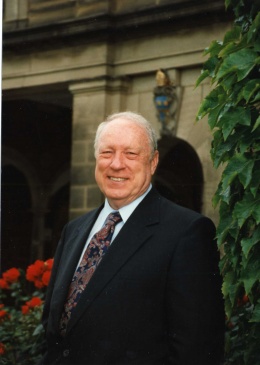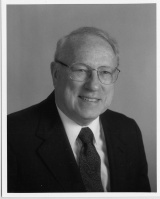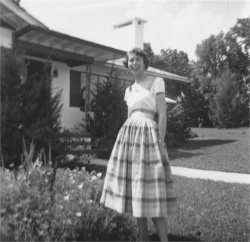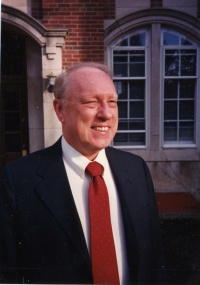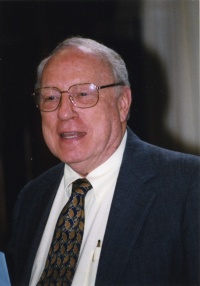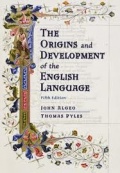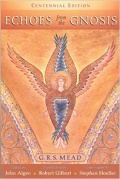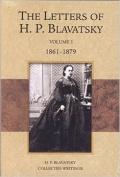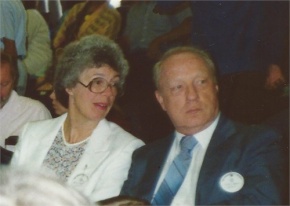John Algeo: Difference between revisions
No edit summary |
|||
| (32 intermediate revisions by 3 users not shown) | |||
| Line 1: | Line 1: | ||
[[File:John Algeo 1.jpg|260px|right|thumb|Dr. John Algeo]] | |||
< | '''John Algeo''' ([[November 12]], 1930 - [[October 13]], 2019) was an American professor who was President of the [[Theosophical Society in America]] from 1993–2002, and then served as Vice President of the international [[Theosophical Society (Adyar)|Theosophical Society]] in Adyar, Chennai, India until 2008. He had a distinguished academic career at the University of Georgia as a professor of English language and linguistics, and then was Professor Emeritus. In 2014, Dr. Algeo was awarded the [[Subba Row Medal]] for his significant contributions to Theosophical literature. | ||
== Early life == | |||
John Thomas Algeo was born [[November 12]], 1930 in St. Louis, Missouri to Thomas and Julia Algeo. Julia's aunt Kitty taught John to read at a very young age, using adult classics like ''Robinson Crusoe'' for practice. In 1941, the family moved to Miami, Florida, where Thomas worked as a plumber and Julia as a waitress.<ref>Florida State Census, 1945.</ref> As a middle school student, John worked in a public library, where he "discovered a book entitled Words and Ways of American English by Thomas Pyles, then of the University of Florida. I read it and found it so interesting that I determined to go to the University of Florida to study with him, which I eventually did."<ref>John Algeo, "My Life in Theosophy and Otherwise." Word document given to Janet Kerschner in June 2013. Theosophical Society in America Archives.</ref> | |||
== Joining the Theosophical Society == | |||
The Algeos were nominally Roman Catholic, but John had little religious instruction until he took a catechism class at a Catholic church in Miami. | |||
<blockquote> | |||
We used the old Baltimore Catechism, a conventional exposition of the faith. But we were also encouraged to borrow books from the parish library. | |||
<br> | <br> | ||
Poking about in the parish library, I came upon a series of little pamphlets on “dangerous heresies,” one of which dealt with Theosophy, which was completely new to me. When I read the pamphlet, however, I was immediately interested … The Theosophy of the pamphlet brought together a good many ideas and themes that I had cobbled together on my own while reading about various religions in my uncle’s encyclopedia.<ref>John Algeo, "My Life in Theosophy and Otherwise."</ref> | |||
</blockquote> | |||
Soon afterward John attended a public meeting of the Theosophical Society in Miami, and he was offered the loan of ''Elementary Theosophy'', by [[L. W. Rogers]]. With his mother's consent he joined the Society at age 17 in 1947. | |||
== Military service == | |||
After two years at the University of Miami, John dropped out to go to New York for a couple of years, then joined the army. | |||
<blockquote> | |||
I served in the United States Army for three years, 1951–54. In the US, I was stationed in South Carolina, then in North Carolina, and finally was sent overseas to Korea. That was during the final years of the Korean conflict... I was promoted to the rank of Sergeant in Korea, where my principal duty assignment was with the United Nations Command Military Armistice Commission, in Munsan-ni, Korea. | |||
<br> | <br> | ||
After completing my tour of duty in Korea, I returned to the U.S. and was discharged.<ref>John Algeo, "My Life in Theosophy and Otherwise."</ref> | |||
</blockquote> | |||
== Education and academic career == | |||
After his military service, John returned to the University of Miami to complete his bachelor’s degree, cum laude, in 1955, majoring in English. He went on to the University of Florida to study with C. W. Wrenn (visiting from Oxford University) and then Thomas Pyles, whose book had impressed him at a young age. | |||
<blockquote> | |||
At the University of Florida, my major professor and thus academic godfather was Thomas Pyles, whose major work was a history of the English language entitled The Origins and Development of the English Language. When he produced the first edition of that book, the publishers … decided it needed a workbook to accompany it. Pyles was not a work-book sort, so he passed the job on to me, and in 1966 I produced the first edition of Problems in the Origins and Development of the English Language, which went through many subsequent editions, as did the primary text.<ref>John Algeo, "My Life in Theosophy and Otherwise."</ref> | |||
</blockquote> | |||
[[File:John Algeo 2.jpg|160px|left|thumb|Dr. John Algeo]] | |||
During his years at the University of Florida in Gainesville, Algeo earned a Master of Arts in English with a minor in religion, in 1957. He spent two summers at the Linguistic Institute at the University of Michigan. In 1960 he completed a doctorate in linguistics at the University of Florida. Honors included Phi Beta Kappa and Phi Kappa Phi. Dr. Algeo's first full-time teaching job was at Florida State University in Tallahassee; he worked summer terms at Troy State College in Alabama. The University of Florida offered a position as Assistant Professor, and Dr. Algeo rose through the ranks to become an Associate Professor, then full Professor. He also served as Assistant Dean of the Graduate School and Director of the Program in Linguistics. When he was offered the Deanship, he chose instead to take a position as Professor of English (1971–88) at the University of Georgia in Athens. Subsequently he became Head of the Department of English (1975–79), and Alumni Foundation Distinguished Professor of English (1988–94). In 1985, he served as an Exchange Professor at the University of Erlangen, Germany, and in 1986 as an Honorary Research Fellow at University College, London. Now in retirement, he bears the title of Professor Emeritus. | |||
Dr. Algeo served as President of several professional groups: the American Dialect Society, the American Name Society, and the Dictionary Society of North America. He was editor of ''American Speech'', the journal of the American Dialect Society, and with his wife, Adele, wrote "Among the New Words", a regular feature of ''American Speech''. | |||
[[File:Adele Silbereisen.jpg|right|250px|thumb|Adele Silbereisen]] | |||
== Marriage == | |||
On September 6, 1958, John married Adele Marie Silbereisen (8 July 1933 - 15 March 2010), in the Episcopal Chapel of the University of Florida, in Gainesville. They had met on campus while attending the same class in Anglo-Saxon, taught by the famous C. W. Wrenn. Adele was majoring in anthropology/archeology, and minoring in English at the time John was studying for his doctorate in English. From that time on, the two worked together on all of John's many projects in academia, in the Theosophical Society, and in Co-Freemasonry. They had a son and a daughter. | |||
== Theosophical Society activities == | |||
On August 31, 1947, John Algeo became a member of the [[Theosophical Society in America]]. He wrote, "Because of my young age … I became a sort of wunderkind in Miami. I was soon elected president of the <nowiki>[</nowiki>Florida<nowiki>]</nowiki> Lodge <nowiki>[</nowiki>now known as Deerfield Lodge<nowiki>]</nowiki> and then of the Florida Federation."<ref>John Algeo, "My Life in Theosophy and Otherwise."</ref> | |||
[[File:John Algeo 3.jpg|230px|right|thumb|Lecturing at [[Olcott (campus)|Olcott]]]] | |||
Here are highlights of his service to the Theosophical Society: | |||
::'''1970s – 1980s''': President of Atlanta Lodge; President of Mid-South Federation; Chair of Board of Directors of Stil-Light Theosophical Center, North Carolina. | |||
::'''1984 – 1987''': Member of the National Board of Directors, Southeast District of the Theosophical Society in America | |||
::'''1987 – 1993''': First Vice-President of the Theosophical Society in America during the administration of [[Dorothy Abbenhouse]]. | |||
::'''1993 – 2002''': National President of the Theosophical Society in America; Editor of [[The American Theosophist (periodical)|''The American Theosophist'']] and [[The Quest (periodical)|''The Quest'']] magazine. | |||
::'''2002 - 2008''': International Vice-President of the Theosophical Society in the administration of [[Radha Burnier]]; Board member of [[The Manor|the Manor Foundation]], Mossman, Australia.<ref>Anonymous, "Notice - John Algeo elected International Vice-President," The Theosophist v123 (February 2002), 190.</ref> | |||
During all these years, Dr. Algeo was much in demand as a lecturer on five continents. He was always a very engaging speaker, and he spoke at Theosophical meetings throughout the United States and in Australia, Brazil, Canada, Denmark, England, Finland, Germany, India, Israel, the Netherlands, New Zealand, Scotland, Spain, Sweden, Ireland, and Wales. Many of Dr. Algeo's talks are available in audio and video formats from [[Henry S. Olcott Memorial Library]]. | |||
== Presidency of Theosophical Society == | |||
Dr. Algeo's administration was a very active time for the Theosophical Society in America, as he described in a summary of noteworthy events in the summer 2002 issue of [[The Messenger (periodical)|''The Messenger'']].<ref>John Algeo, "Looking Farther Back ...," ''The Messenger'' No. 59 (July-August 2002), 5-6.</ref> He took office the year of the '''[[Parliament of the World's Religions (1993)|Parliament of the World's Religions]]''' in Chicago. The TSA worked with the [[United Lodge of Theosophists]] and the [[Theosophical Society (Pasadena)|Theosophical Society based in Pasadena]] to present over 20 sessions at the Parliament and special events on the headquarters campus. | |||
In 1996, Dr. Algeo was asked to present the '''[[Blavatsky Lectures|Blavatsky Lecture]]''' at the Theosophical Society in England. His topic was [http://resources.theosophical.org/pdf/BL_1996_Algeo_Blavatsky_Freemasonry_and_the_Western_Mystery_Tradition.pdf "Blavatsky, Freemasonry, and the Western Mystery Tradition"]. | |||
In the realm of '''publishing''', the quality of [[Quest Books]] was reflected by increased sales and industry awards. A series of Wisdom Tradition Books was issued. Audiovisual materials were also being published in audio and video cassettes, with Eternal Quest TV shows broadcast in a number of cities. Theosophical sessions of the Parliament were produced jointly with the other two Theosophical organizations in a series of videocassettes. | |||
The public quarterly version of [[The Quest (periodical)|''The Quest'']] '''magazine''' was discontinued in November 1998 for financial reasons. The new version of ''The Quest'' was issued bimonthly, replacing the former member publication, [[The American Theosophist (periodical)|''The American Theosophist]]. [[The Messenger (periodical)|''The Messenger'']] became the members’ newsletter. A skilled Graphics Department staff improved the design of the publications, information leaflets, and Theosophical Publishing House catalog. | |||
[[File:John Algeo 7.jpg|200px|left|thumb|Dr. Algeo at Olcott]] | |||
The '''[[Olcott (campus)|headquarters estate]]''' saw numerous improvements: | |||
* Installation in 1997 of an elevator and a lobby chair lift for wheelchair access. | |||
* Transfer of the campus from a well to a city water supply. | |||
* Creation of the Garden of Remembrance in 2001. It was completed with a plaque added in 2003. | |||
* Construction of a labyrinth in 1998. | |||
* Installation of air conditioning in the kitchen and dining hall. | |||
* Move of the AV Department to the third floor, and conversion of the old AV room into archival storage in 1999. | |||
* Establishment of the Olcott Gallery, curated by Pamela Lowrie, for displays by artists. | |||
* Renovation of art works - the Gutzon Borglum portrait of H. P. Blavatsky and the HPB tiara. | |||
* Installation of art works from several donors - John and Anne Kern, [[Don Kruse]], [[Burton Callicott]], [[Beatrice Wood]], and Pamela Lowrie. | |||
The '''Olcott Institute of Theosophy''' was established, with Dr. Anton Lysy as Dean and such high-caliber lecturers as Michael Gomes, Mary Anderson, Maria Parisen, and John Algeo. Residential educational programs for seniors were introduced under Elderhostel. Year-round, varied '''programming''' was scheduled on the Olcott campus, with regular Tuesday and Wednesday night series focusing on Theosophical topics. In 1998, the [[Inter-American Theosophical Federation]] held a conference at Olcott, with 70 delegates attending. The Young Theosophists reformed and held a retreat at Camp Indralaya. | |||
'''Technology''' was a major focus during the Algeo administration, with Ruben Cabigting heading the Information Systems Department. | |||
* Implementation of an '''e-learning''' system, offering high-quality classes.<ref>Anonymous, "E-learning courses available: 'Understanding Mysticism'; 'The Key to Theosophy' by HP Blavatsky, comments by Tony Lysy and John Algeo," ''The Quest'' 92.5 (Sep-Oct 1988), 198.</ref> | |||
* Creation of '''websites''' for the Society at ([http://www.theosophical.org www.theosophical.org]) and Quest Books [no longer available]. | |||
* '''Automation''' of the [[Henry S. Olcott Memorial Library]] with Sirsi software under Elisabeth Trumpler, with a grant from [[The Kern Foundation]]. | |||
* A custom-designed '''Membership Database was''' developed by Richard Ellwood. | |||
* Production of '''CDs''', with digitized sound recordings added to the TSA website and e-learning. | |||
When John Algeo left office in 2002, '''membership''' stood at 5284, an 29% increase over the last four years. There were 53 lodges, 62 study centers, and 4 provisional study centers. He was succeeded in the Presidency by his Vice President, [[Betty Bland]]. | |||
[[ | |||
== | [[File:John Algeo 6.jpg|200px|right|thumb|Dr. Algeo]] | ||
== International Vice Presidency == | |||
From 2002-2008, Dr. Algeo served as International Vice-President of the Theosophical Society in the administration of [[Radha Burnier]]. He continued lecturing and writing, and also served as a Board member of the Manor Foundation, Mosman, Australia.<ref>Anonymous, "Notice - John Algeo elected International Vice-President," The Theosophist v123 (February 2002), 190.</ref> | |||
One especially important event occurred in June 2005 in Belfast, Ireland, when he presided over the Inauguration of the Regional Association of the '''Theosophical Society in Ireland'''. The Northern and Southern Lodges were united under one umbrella. According the Theosophical Society in Ireland, "After many, many gruelling years of troubles this was indeed an auspicious and very significant event. Since that special Meeting in Belfast at which John presided, attended by Theosophists from the length and breadth of Ireland, we have held annually an All Ireland Convention in Dublin."<ref>Marie Harkness email to Theosophical Society in America, March 19, 2015. Theosophical Society in America Archives.</ref> | |||
== | == Co-Freemasonry == | ||
Dr. Algeo wrote: | |||
<blockquote> | |||
I became a Co-Freemason while on a year’s academic appointment at the University of London. While there I met a wonderful woman, Elisabeth Dowdle. She was from Hungary, where her family had run a large and prestigious legitimate theater in Budapest. At the start of World War II, Elisabeth was in England working as an au pair, and that saved her life, as the rest of her family, who were Jews, were shipped off to Buchenwald and killed . . . | |||
Elisabeth Dowdle was a Co-Mason, and through her, I was made an Entered Apprentice on April 2, 1987, in Lodge St. Germain, No. 904, Orient of London. Over the years I gradually rose through all the Degrees to the thirty-third in 2002. Co-Freemasonry and Theosophy have no formal connection, but they fit together nicely in that Masonry is a practice in need of a theory and Theosophy is a theory in need of a practice. Theosophy, of course, also has other and more applied practices, such as the Theosophical Order of Service, but various kinds of practices have their own uses and benefits. | |||
. . . I eventually became in our Masonic Order “Most Illustrious Grand Master of the North American Administration, and Vice President and Secretary to the Supreme Council, Eastern Order of International Co-Freemasonry.”<ref>John Algeo, "My Life in Theosophy and Otherwise."</ref> | |||
</blockquote> | |||
He also was affiliated with the nonlocal Pilgrims Lodge of that Order. | |||
== Later years == | == Later years == | ||
== | After Adele passed away in 2010, her ashes were buried in the Garden of Remembrance at the [[Olcott (campus)|headquarters campus]] of the [[Theosophical Society in America]], where the Algeos had lived for nine years. Dr. Algeo moved from Georgia to Bowling Green, Kentucky to be near his daughter. He continued pursuing literary interests and helped to develop an electronic periodical [https://www.theosophyforward.com/ ''Theosophy Forward'']. He passed away on [[October 13]], 2019. | ||
== Academic writings == | |||
[[File:Origins cover.jpg|right|120px|thumb|Pyles-Algeo 5th edition]] | |||
Dr. Algeo was always a prolific writer and speaker. In his academic career he wrote at least 11 books, 150 articles, and 95 book reviews, and made around 100 presentations at scholarly meetings. | |||
=== Books === | |||
* '''''British or American English? a Handbook of Word and Grammar Patterns'''''. Cambridge, New York: Cambridge University Press, 2006. | |||
* '''''The Cambridge history of the English language. / Vol. 6, English in North America'''''. Cambridge, New York: Cambridge University Press, 2001. Algeo served as editor and contributing author of volume 6. | |||
* '''''English in North America'''''. Cambridge: Cambridge University Press, 2001. | |||
* '''''Exercises in contemporary English'''''. New York: Harcourt Brace Jovanovich, 1974. | |||
* '''''Fifty Years among the New Words: A Dictionary of Neologisms 1941–1991'''''. Cambridge University Press 1993. Compiled from "Among the New Words," a feature of ''American Speech'', the journal of the American Dialect Society for fifty years. | |||
* '''''On Defining the Proper Name'''''. Gainesville, University of Florida Press, 1973. | |||
* '''''The Origins and Development of the English Language'''''. Thomas Pyles wrote the first two editions in 1964 and 1971, and John Algeo is credited as coauthoring the third through seventh editions in 1982, 1992, 2004, 2010, and 2013. | |||
* ''''' Problems in the Origins and Development of the English Language'''''. A workbook to accompany Thomas Pyles' book ''The Origins and Development of the English Language''. New York: Harcourt Brace Jovanovich, 1972 and other editions. | |||
=== Articles === | |||
The University of Georgia has posted several of Algeo's articles online at [https://uga.academia.edu/JohnAlgeo Academia.edu], reprinted from various journals. These examples give an indication of the range of his interests: | |||
* "The American Language and Its British Dialect" | |||
* "The Australianness of Australian Place Names" | |||
* "Cantjara Datreveno de Esperanto" | |||
* "The Earliest English Grammars" | |||
* "Korean Bamboo English" | |||
* "Magic Names: Onomastics in the Fantasies of Ursula Le Guin" | |||
* "Onomastics as an Interdisciplinary Study" | |||
* "What Makes English Good?" | |||
[[File:Echoes from the Gnosis.jpg|right|120px|thumb|''Echoes from the Gnosis'']] | |||
[[File:Letters of HPB cover.jpg|right|120px|thumb|''Letters of H. P. Blavatsky'']] | |||
== Theosophical writings == | |||
In his writings and presentations on Theosophical subjects, Dr. Algeo often found ways to link to his academic specialties. He defines and explores words, both common and unusual, to bring new understanding to his audience. He explored mythology and modern literature to enliven the concepts of Theosophy for young and old alike, with talks and articles about Mary Poppins, Harry Potter, the Wizard of Oz, Alice in Wonderland, and Tolkien's ''Lord of the Rings'' series. | |||
Working in partnership with Jan Kind of Brazil in 2009, Algeo established an Internet-based periodical called [[Theosophy Forward (periodical)|''Theosophy Forward'']]. Their intention was to provide a new means of connecting members of the Theosophical diaspora, including those active in organizations and also the independent Theosophists. With contributors on four or five continents, ''Theosophy Forward'' has been successfully building bridges of understanding in a truly international effort. John Algeo sometimes used the whimsical pseudonym "Prof. Abditus Questor" in writing for ''Theosophy Forward''. | |||
=== Books, study guides, and pamphlets === | |||
* '''''Blavatsky, Freemasonry, & the Western Mystery Tradition'''''. London: Theosophical Society in England, 1996. | |||
* '''''Echoes from the Gnosis''''' by G. R. S. Mead. John Algeo edited a new edition published in 2006 by Quest Books. | |||
* '''''The Essentials of Theosophy'''''. Sydney, Australia: The Theosophical society in Australia, 2007. | |||
* '''''Getting Acquainted with “The Secret Doctrine”'''''. Wheaton, IL: Education Department, Theosophical Society in America, 1990. This study guide lists Robert Bowen as coauthor. | |||
* '''''Letters of H. P. Blavatsky Volume I 1861-1889'''''. Wheaton, IL: Theosophical Publishing House, 2003. Dr. Algeo edited this work. Additional volumes are being edited by Jon Knebel. | |||
* '''''The Power Of Thought: A Twenty-First Century Adaptation Of Annie Besant's Classic Work, Thought Power'''''. Wheaton, IL: Theosophical Publishing House/Quest Books, 2001. Shirley Nicholson co-edited. | |||
* '''''Reincarnation'''''. Wheaton, IL: Theosophical Publishing House, 1988. Audiobook with Geddes MacGregor. | |||
* '''[https://www.theosophyforward.com/pdf/ReincarnationExplored.pdf?utm_source=phplist85&utm_medium=email&utm_content=HTML&utm_campaign=NEWSLETTER+-+OCTOBER+2019+%282%29 ''Reincarnation Explored'']'''. Wheaton, IL: Theosophical Publishing House, 1987. | |||
* '''''Senzar, the Mystery of the Mystery Language'''''. Theosophical History Center. Pamphlet. | |||
* '''''Theosophy: An Introductory Study Guide'''''. Wheaton, IL: Theosophical Publishing House, 1996. There have been several editions. | |||
* '''''Theosophy and the Zeitgeist'''''. Sydney, Australia: The Theosophical society in Australia, 2007. Reprint of an article. | |||
* '''''Unlocking the Door: Studies in “The Key To Theosophy"'''''. Wheaton, IL: Theosophical Publishing House, 2001. | |||
=== Articles === | |||
Dr. Algeo made many contributions to Theosophical journals around the world. According to the [[Union Index of Theosophical Periodicals]], he published over 500 articles under the names [http://www.austheos.org.au/cgi-bin/ui-csvsearch.pl?search=John+Algeo&method=exact&header=field4 John Algeo] and [http://www.austheos.org.au/cgi-bin/ui-csvsearch.pl?search=J+Algeo&method=exact&header=field4 J Algeo]. Numerous [http://www.austheos.org.au/cgi-bin/ui-csvsearch.pl?search=Algeo&method=exact&header=field3 book reviews] are also listed. One outstanding series of nineteen articles, published in [[The Theosophist (periodical)|''The Theosophist'']], was on "'''Studies in The Voice of the Silence'''." | |||
These are titles of some of his articles: | |||
[[File:Adele and John 1988.jpg|right|290px|thumb|Adele and John Algeo in England, 1988]] | |||
* "The Ancient Wisdom in a Folktale". | |||
* [https://www.theosophyforward.com/articles/theosophy-and-the-society-in-the-public-eye/150-the-ancient-wisdom-of-harry-potter?utm_source=phplist85&utm_medium=email&utm_content=HTML&utm_campaign=NEWSLETTER+-+OCTOBER+2019+%282%29 "The Ancient Wisdom of Harry Potter"]. Note: for the complete series follow Book 1 until 7 through the search option in the right column of ''Theosophy Forward'' the e-Magazine. | |||
* [http://www.katinkahesselink.net/his/Besant-Educator.htm Annie Besant as Instructor and Educator"]. | |||
* "Archetypal Codes". | |||
* [https://www.theosophyforward.com/articles/theosophy-and-the-society-in-the-public-eye/381-art-theosophy-and-kandinsky "Art, Kandinsky, and Self-transformation"]. | |||
* "Australia as the Land of Oz". | |||
* "Blavatsky in Literature". | |||
* "The Buddha and Tolkien". | |||
* [https://www.theosophical.org/files/resources/articles/CainAbel.pdf Cain and Abel: A Theosophical Midrash]. ''The Quest'' January 1997. | |||
* "Contemporary Classics and Theosophical Thought". | |||
* [https://www.theosophyforward.com/articles/theosophy/2700-doing-theosophy?utm_source=phplist85&utm_medium=email&utm_content=HTML&utm_campaign=NEWSLETTER+-+OCTOBER+2019+%282%29 "Doing Theosophy"]. | |||
* [http://www.katinkahesselink.net/other/Algeo-within-outwards.html "From Within Outwards: the Way of the Universe"] – a lecture given in 2007 at the international convention, Adyar. | |||
* [http://www.theosophical.org/files/resources/articles/GoldenStairsCommentary.pdf# The Golden Stairs - Ethics in the Ancient Wisdom tradition]. ''The American Theosophist''. November, 1984. | |||
* [http://www.katinkahesselink.net/other/Harry-Potter-7.htm "Harry Potter and the Dugpa: Looking forward to 'Harry Potter and the Deathly Hallows'"]. | |||
* [http://www.katinkahesselink.net/other/algeo-fathers-potter.htm Harry Potter's Four Fathers: The Quest for the Father in Harry Potter and the Prisoner of Azkaban"] | |||
* [http://www.katinkahesselink.net/other/Harry-Potter-chamber.htm "Harry Potter's Quest in the Chamber of Secrets"]. | |||
* [https://www.theosophyforward.com/articles/theosophy/1149-l-frank-baum-and-theosophy-part-1?utm_source=phplist85&utm_medium=email&utm_content=HTML&utm_campaign=NEWSLETTER+-+OCTOBER+2019+%282%29 "L. Frank Baum and Theosophy - part one"]. Note: for the complete series follow part 1 until 4 through the search option in the right column of ''Theosophy Forward'' the e-Magazine. | |||
* "Language and Religion". | |||
* "The Mahatma Letters for Our Times". | |||
* [http://www.katinkahesselink.net/his/Olcott-Blavatsky.htm "Olcott and Blavatsky: The Theosophical Twins - An Essay in Archetypes"]. | |||
* [https://www.theosophyforward.com/articles/theosophy/58-the-principle-not-the-person?utm_source=phplist85&utm_medium=email&utm_content=HTML&utm_campaign=NEWSLETTER+-+OCTOBER+2019+%282%29 "The Principle, Not the Person"]. Published in ''Theosophy Forward'' April 14, 2009. | |||
* [https://www.theosophyforward.com/articles/theosophy/1256-the-secret-doctrine-a-book-to-be-read-wholly?utm_source=phplist85&utm_medium=email&utm_content=HTML&utm_campaign=NEWSLETTER+-+OCTOBER+2019+%282%29 "The Secret Doctrine - a Book to Be Read Wholly"]. | |||
* [https://www.theosophical.org/files/resources/articles/SpiritualRevolutioninLiterature.pdf The Spiritual Revolution in Literature]. ''The American Theosophist''. May, 1982. | |||
* "Surprised by Joy: Discovering Wholeness in a Fragmented World". | |||
* [https://www.theosophy.world/resource/theosophical-view-war-and-violence-john-algeo A Theosophical View of War and Violence]. ''The American Theosophist'' 70. October, 1982. | |||
* [https://www.theosophyforward.com/pdf/marypoppins.pdf?utm_source=phplist85&utm_medium=email&utm_content=HTML&utm_campaign=NEWSLETTER+-+OCTOBER+2019+%282%29 "Theosophy, Fantasy, and Mary Poppins"]. | |||
* [https://www.theosophyforward.com/articles/theosophy/2623-theosophy-is?utm_source=phplist85&utm_medium=email&utm_content=HTML&utm_campaign=NEWSLETTER+-+OCTOBER+2019+%282%29 "Theosophy Is"]. | |||
* [https://www.theosophyforward.com/articles/theosophy/457-the-voice-of-the-silence-1-verses-1-5?utm_source=phplist85&utm_medium=email&utm_content=HTML&utm_campaign=NEWSLETTER+-+OCTOBER+2019+%282%29 "The Voice of the Silence 1 (Verses 1-5)"]. Note: for the complete series follow Chapter 1 until 20 through the search option in the right column of ''Theosophy Forward'' the e-Magazine. | |||
* [https://www.theosophyforward.com/articles/theosophy/1320-western-history-in-the-light-of-the-seven-rays?utm_source=phplist85&utm_medium=email&utm_content=HTML&utm_campaign=NEWSLETTER+-+OCTOBER+2019+%282%29 Western History in the Light of the Seven Rays"]. | |||
* [https://www.theosophical.org/files/resources/articles/WhatShouldGroupsStudy-1.pdf What Should Theosophical Groups Study? Part 1] and [https://www.theosophical.org/files/resources/articles/WhatShouldGroupsStudy-2.pdf Part 2] . ''The Theosophist'', April and September, 2007. | |||
* [http://www.katinkahesselink.net/other/algeo-white-lotus.htm "White Lotus Day and Its Meaning"]. | |||
* "The Wizard of Oz - The Perilous Journey". | |||
== Recordings of lectures == | |||
* [https://www.youtube.com/watch?v=lla4H00DauQ The Alchemical Code]. | |||
* [https://archive.org/details/theesotericinmodernart The Esoteric in Modern Art]. | |||
* [https://www.youtube.com/watch?v=vtRpZ4NQ9vw The Essence of Theosophy] with [[Joy Mills]]. | |||
* [https://www.youtube.com/watch?v=q2-mK5Z3ySY The Fantastic Code]. | |||
* [https://www.youtube.com/watch?v=OcWYX9o_tqU The Fibonacci Sequence]. | |||
* [https://www.youtube.com/watch?v=mkVnIzyw2kY The Gnostic Code]. | |||
* [https://www.youtube.com/watch?v=5Apfb82A53s Guideposts for Living---At the Feet of the Master]. | |||
* [https://www.youtube.com/watch?v=zJVljBJosDM Henry Steel Olcott: A Life of Service]. | |||
* [https://www.youtube.com/watch?v=6isGw1VFKBI HPB's Diagram of Meditation]. | |||
* [https://www.youtube.com/watch?v=XkuoD4urZfI The Kabbalistic Code]. | |||
* [https://www.youtube.com/watch?v=irjgVTAhcqM The Man Who Met the Masters: Henry Steel Olcott]. | |||
* [https://www.youtube.com/watch?v=5NE6CPbP8FU The Masonic Code]. | |||
* [https://www.youtube.com/watch?v=Y7IVyQiSxDc The Mysteries: Ancient and Modern]. | |||
* [https://www.youtube.com/watch?v=3gN5f1LjdXE Olcott and Blavatsky: Theosophical Twins]. | |||
* [https://www.youtube.com/watch?v=X00nn7Ir1Ic The Seven Rays: Keys to World Peace and Personal Wholeness]. Presented at Theosophical Society in America on May 11, 2006. | |||
* [https://www.youtube.com/watch?v=5FsAl6QJa5M Reincarnation: The Untrue Fact]. | |||
* [https://www.youtube.com/watch?v=4POYn_VsQXY Spiritual Practice as Social Action, Social Action as Spiritual Practice]. | |||
* [https://www.youtube.com/watch?v=2kdRaIc1sUo Who Are the Founders? Chaos, Plan, and Order in the Society's History]. | |||
== Other resources == | |||
* '''Records of the Dialect Society''' are at the University of Missouri | |||
* '''John Algeo Papers'''. Records Series 08.12. Theosophical Society in America Archives. These papers are from the nine years of his presidency at the Theosophical Society in America. | |||
* Harris, Linda. '''"Interview with Dr John Algeo."''' ''Theosophy in Australia'' v59 (November 1995), 108. | |||
== Notes == | == Notes == | ||
| Line 34: | Line 235: | ||
[[Category:Co-Masons|Algeo, John]] | [[Category:Co-Masons|Algeo, John]] | ||
[[Category:Nationality American|Algeo, John]] | [[Category:Nationality American|Algeo, John]] | ||
[[Category:Military|Algeo, John]] | |||
[[Category:People|Algeo, John]] | |||
Latest revision as of 21:51, 27 December 2023
John Algeo (November 12, 1930 - October 13, 2019) was an American professor who was President of the Theosophical Society in America from 1993–2002, and then served as Vice President of the international Theosophical Society in Adyar, Chennai, India until 2008. He had a distinguished academic career at the University of Georgia as a professor of English language and linguistics, and then was Professor Emeritus. In 2014, Dr. Algeo was awarded the Subba Row Medal for his significant contributions to Theosophical literature.
Early life
John Thomas Algeo was born November 12, 1930 in St. Louis, Missouri to Thomas and Julia Algeo. Julia's aunt Kitty taught John to read at a very young age, using adult classics like Robinson Crusoe for practice. In 1941, the family moved to Miami, Florida, where Thomas worked as a plumber and Julia as a waitress.[1] As a middle school student, John worked in a public library, where he "discovered a book entitled Words and Ways of American English by Thomas Pyles, then of the University of Florida. I read it and found it so interesting that I determined to go to the University of Florida to study with him, which I eventually did."[2]
Joining the Theosophical Society
The Algeos were nominally Roman Catholic, but John had little religious instruction until he took a catechism class at a Catholic church in Miami.
We used the old Baltimore Catechism, a conventional exposition of the faith. But we were also encouraged to borrow books from the parish library.
Poking about in the parish library, I came upon a series of little pamphlets on “dangerous heresies,” one of which dealt with Theosophy, which was completely new to me. When I read the pamphlet, however, I was immediately interested … The Theosophy of the pamphlet brought together a good many ideas and themes that I had cobbled together on my own while reading about various religions in my uncle’s encyclopedia.[3]
Soon afterward John attended a public meeting of the Theosophical Society in Miami, and he was offered the loan of Elementary Theosophy, by L. W. Rogers. With his mother's consent he joined the Society at age 17 in 1947.
Military service
After two years at the University of Miami, John dropped out to go to New York for a couple of years, then joined the army.
I served in the United States Army for three years, 1951–54. In the US, I was stationed in South Carolina, then in North Carolina, and finally was sent overseas to Korea. That was during the final years of the Korean conflict... I was promoted to the rank of Sergeant in Korea, where my principal duty assignment was with the United Nations Command Military Armistice Commission, in Munsan-ni, Korea.
After completing my tour of duty in Korea, I returned to the U.S. and was discharged.[4]
Education and academic career
After his military service, John returned to the University of Miami to complete his bachelor’s degree, cum laude, in 1955, majoring in English. He went on to the University of Florida to study with C. W. Wrenn (visiting from Oxford University) and then Thomas Pyles, whose book had impressed him at a young age.
At the University of Florida, my major professor and thus academic godfather was Thomas Pyles, whose major work was a history of the English language entitled The Origins and Development of the English Language. When he produced the first edition of that book, the publishers … decided it needed a workbook to accompany it. Pyles was not a work-book sort, so he passed the job on to me, and in 1966 I produced the first edition of Problems in the Origins and Development of the English Language, which went through many subsequent editions, as did the primary text.[5]
During his years at the University of Florida in Gainesville, Algeo earned a Master of Arts in English with a minor in religion, in 1957. He spent two summers at the Linguistic Institute at the University of Michigan. In 1960 he completed a doctorate in linguistics at the University of Florida. Honors included Phi Beta Kappa and Phi Kappa Phi. Dr. Algeo's first full-time teaching job was at Florida State University in Tallahassee; he worked summer terms at Troy State College in Alabama. The University of Florida offered a position as Assistant Professor, and Dr. Algeo rose through the ranks to become an Associate Professor, then full Professor. He also served as Assistant Dean of the Graduate School and Director of the Program in Linguistics. When he was offered the Deanship, he chose instead to take a position as Professor of English (1971–88) at the University of Georgia in Athens. Subsequently he became Head of the Department of English (1975–79), and Alumni Foundation Distinguished Professor of English (1988–94). In 1985, he served as an Exchange Professor at the University of Erlangen, Germany, and in 1986 as an Honorary Research Fellow at University College, London. Now in retirement, he bears the title of Professor Emeritus.
Dr. Algeo served as President of several professional groups: the American Dialect Society, the American Name Society, and the Dictionary Society of North America. He was editor of American Speech, the journal of the American Dialect Society, and with his wife, Adele, wrote "Among the New Words", a regular feature of American Speech.
Marriage
On September 6, 1958, John married Adele Marie Silbereisen (8 July 1933 - 15 March 2010), in the Episcopal Chapel of the University of Florida, in Gainesville. They had met on campus while attending the same class in Anglo-Saxon, taught by the famous C. W. Wrenn. Adele was majoring in anthropology/archeology, and minoring in English at the time John was studying for his doctorate in English. From that time on, the two worked together on all of John's many projects in academia, in the Theosophical Society, and in Co-Freemasonry. They had a son and a daughter.
Theosophical Society activities
On August 31, 1947, John Algeo became a member of the Theosophical Society in America. He wrote, "Because of my young age … I became a sort of wunderkind in Miami. I was soon elected president of the [Florida] Lodge [now known as Deerfield Lodge] and then of the Florida Federation."[6]
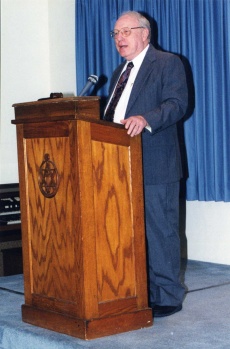
Here are highlights of his service to the Theosophical Society:
- 1970s – 1980s: President of Atlanta Lodge; President of Mid-South Federation; Chair of Board of Directors of Stil-Light Theosophical Center, North Carolina.
- 1984 – 1987: Member of the National Board of Directors, Southeast District of the Theosophical Society in America
- 1987 – 1993: First Vice-President of the Theosophical Society in America during the administration of Dorothy Abbenhouse.
- 1993 – 2002: National President of the Theosophical Society in America; Editor of The American Theosophist and The Quest magazine.
- 2002 - 2008: International Vice-President of the Theosophical Society in the administration of Radha Burnier; Board member of the Manor Foundation, Mossman, Australia.[7]
During all these years, Dr. Algeo was much in demand as a lecturer on five continents. He was always a very engaging speaker, and he spoke at Theosophical meetings throughout the United States and in Australia, Brazil, Canada, Denmark, England, Finland, Germany, India, Israel, the Netherlands, New Zealand, Scotland, Spain, Sweden, Ireland, and Wales. Many of Dr. Algeo's talks are available in audio and video formats from Henry S. Olcott Memorial Library.
Presidency of Theosophical Society
Dr. Algeo's administration was a very active time for the Theosophical Society in America, as he described in a summary of noteworthy events in the summer 2002 issue of The Messenger.[8] He took office the year of the Parliament of the World's Religions in Chicago. The TSA worked with the United Lodge of Theosophists and the Theosophical Society based in Pasadena to present over 20 sessions at the Parliament and special events on the headquarters campus.
In 1996, Dr. Algeo was asked to present the Blavatsky Lecture at the Theosophical Society in England. His topic was "Blavatsky, Freemasonry, and the Western Mystery Tradition".
In the realm of publishing, the quality of Quest Books was reflected by increased sales and industry awards. A series of Wisdom Tradition Books was issued. Audiovisual materials were also being published in audio and video cassettes, with Eternal Quest TV shows broadcast in a number of cities. Theosophical sessions of the Parliament were produced jointly with the other two Theosophical organizations in a series of videocassettes.
The public quarterly version of The Quest magazine was discontinued in November 1998 for financial reasons. The new version of The Quest was issued bimonthly, replacing the former member publication, The American Theosophist. The Messenger became the members’ newsletter. A skilled Graphics Department staff improved the design of the publications, information leaflets, and Theosophical Publishing House catalog.
The headquarters estate saw numerous improvements:
- Installation in 1997 of an elevator and a lobby chair lift for wheelchair access.
- Transfer of the campus from a well to a city water supply.
- Creation of the Garden of Remembrance in 2001. It was completed with a plaque added in 2003.
- Construction of a labyrinth in 1998.
- Installation of air conditioning in the kitchen and dining hall.
- Move of the AV Department to the third floor, and conversion of the old AV room into archival storage in 1999.
- Establishment of the Olcott Gallery, curated by Pamela Lowrie, for displays by artists.
- Renovation of art works - the Gutzon Borglum portrait of H. P. Blavatsky and the HPB tiara.
- Installation of art works from several donors - John and Anne Kern, Don Kruse, Burton Callicott, Beatrice Wood, and Pamela Lowrie.
The Olcott Institute of Theosophy was established, with Dr. Anton Lysy as Dean and such high-caliber lecturers as Michael Gomes, Mary Anderson, Maria Parisen, and John Algeo. Residential educational programs for seniors were introduced under Elderhostel. Year-round, varied programming was scheduled on the Olcott campus, with regular Tuesday and Wednesday night series focusing on Theosophical topics. In 1998, the Inter-American Theosophical Federation held a conference at Olcott, with 70 delegates attending. The Young Theosophists reformed and held a retreat at Camp Indralaya.
Technology was a major focus during the Algeo administration, with Ruben Cabigting heading the Information Systems Department.
- Implementation of an e-learning system, offering high-quality classes.[9]
- Creation of websites for the Society at (www.theosophical.org) and Quest Books [no longer available].
- Automation of the Henry S. Olcott Memorial Library with Sirsi software under Elisabeth Trumpler, with a grant from The Kern Foundation.
- A custom-designed Membership Database was developed by Richard Ellwood.
- Production of CDs, with digitized sound recordings added to the TSA website and e-learning.
When John Algeo left office in 2002, membership stood at 5284, an 29% increase over the last four years. There were 53 lodges, 62 study centers, and 4 provisional study centers. He was succeeded in the Presidency by his Vice President, Betty Bland.
International Vice Presidency
From 2002-2008, Dr. Algeo served as International Vice-President of the Theosophical Society in the administration of Radha Burnier. He continued lecturing and writing, and also served as a Board member of the Manor Foundation, Mosman, Australia.[10]
One especially important event occurred in June 2005 in Belfast, Ireland, when he presided over the Inauguration of the Regional Association of the Theosophical Society in Ireland. The Northern and Southern Lodges were united under one umbrella. According the Theosophical Society in Ireland, "After many, many gruelling years of troubles this was indeed an auspicious and very significant event. Since that special Meeting in Belfast at which John presided, attended by Theosophists from the length and breadth of Ireland, we have held annually an All Ireland Convention in Dublin."[11]
Co-Freemasonry
Dr. Algeo wrote:
I became a Co-Freemason while on a year’s academic appointment at the University of London. While there I met a wonderful woman, Elisabeth Dowdle. She was from Hungary, where her family had run a large and prestigious legitimate theater in Budapest. At the start of World War II, Elisabeth was in England working as an au pair, and that saved her life, as the rest of her family, who were Jews, were shipped off to Buchenwald and killed . . .
Elisabeth Dowdle was a Co-Mason, and through her, I was made an Entered Apprentice on April 2, 1987, in Lodge St. Germain, No. 904, Orient of London. Over the years I gradually rose through all the Degrees to the thirty-third in 2002. Co-Freemasonry and Theosophy have no formal connection, but they fit together nicely in that Masonry is a practice in need of a theory and Theosophy is a theory in need of a practice. Theosophy, of course, also has other and more applied practices, such as the Theosophical Order of Service, but various kinds of practices have their own uses and benefits. . . . I eventually became in our Masonic Order “Most Illustrious Grand Master of the North American Administration, and Vice President and Secretary to the Supreme Council, Eastern Order of International Co-Freemasonry.”[12]
He also was affiliated with the nonlocal Pilgrims Lodge of that Order.
Later years
After Adele passed away in 2010, her ashes were buried in the Garden of Remembrance at the headquarters campus of the Theosophical Society in America, where the Algeos had lived for nine years. Dr. Algeo moved from Georgia to Bowling Green, Kentucky to be near his daughter. He continued pursuing literary interests and helped to develop an electronic periodical Theosophy Forward. He passed away on October 13, 2019.
Academic writings
Dr. Algeo was always a prolific writer and speaker. In his academic career he wrote at least 11 books, 150 articles, and 95 book reviews, and made around 100 presentations at scholarly meetings.
Books
- British or American English? a Handbook of Word and Grammar Patterns. Cambridge, New York: Cambridge University Press, 2006.
- The Cambridge history of the English language. / Vol. 6, English in North America. Cambridge, New York: Cambridge University Press, 2001. Algeo served as editor and contributing author of volume 6.
- English in North America. Cambridge: Cambridge University Press, 2001.
- Exercises in contemporary English. New York: Harcourt Brace Jovanovich, 1974.
- Fifty Years among the New Words: A Dictionary of Neologisms 1941–1991. Cambridge University Press 1993. Compiled from "Among the New Words," a feature of American Speech, the journal of the American Dialect Society for fifty years.
- On Defining the Proper Name. Gainesville, University of Florida Press, 1973.
- The Origins and Development of the English Language. Thomas Pyles wrote the first two editions in 1964 and 1971, and John Algeo is credited as coauthoring the third through seventh editions in 1982, 1992, 2004, 2010, and 2013.
- Problems in the Origins and Development of the English Language. A workbook to accompany Thomas Pyles' book The Origins and Development of the English Language. New York: Harcourt Brace Jovanovich, 1972 and other editions.
Articles
The University of Georgia has posted several of Algeo's articles online at Academia.edu, reprinted from various journals. These examples give an indication of the range of his interests:
- "The American Language and Its British Dialect"
- "The Australianness of Australian Place Names"
- "Cantjara Datreveno de Esperanto"
- "The Earliest English Grammars"
- "Korean Bamboo English"
- "Magic Names: Onomastics in the Fantasies of Ursula Le Guin"
- "Onomastics as an Interdisciplinary Study"
- "What Makes English Good?"
Theosophical writings
In his writings and presentations on Theosophical subjects, Dr. Algeo often found ways to link to his academic specialties. He defines and explores words, both common and unusual, to bring new understanding to his audience. He explored mythology and modern literature to enliven the concepts of Theosophy for young and old alike, with talks and articles about Mary Poppins, Harry Potter, the Wizard of Oz, Alice in Wonderland, and Tolkien's Lord of the Rings series.
Working in partnership with Jan Kind of Brazil in 2009, Algeo established an Internet-based periodical called Theosophy Forward. Their intention was to provide a new means of connecting members of the Theosophical diaspora, including those active in organizations and also the independent Theosophists. With contributors on four or five continents, Theosophy Forward has been successfully building bridges of understanding in a truly international effort. John Algeo sometimes used the whimsical pseudonym "Prof. Abditus Questor" in writing for Theosophy Forward.
Books, study guides, and pamphlets
- Blavatsky, Freemasonry, & the Western Mystery Tradition. London: Theosophical Society in England, 1996.
- Echoes from the Gnosis by G. R. S. Mead. John Algeo edited a new edition published in 2006 by Quest Books.
- The Essentials of Theosophy. Sydney, Australia: The Theosophical society in Australia, 2007.
- Getting Acquainted with “The Secret Doctrine”. Wheaton, IL: Education Department, Theosophical Society in America, 1990. This study guide lists Robert Bowen as coauthor.
- Letters of H. P. Blavatsky Volume I 1861-1889. Wheaton, IL: Theosophical Publishing House, 2003. Dr. Algeo edited this work. Additional volumes are being edited by Jon Knebel.
- The Power Of Thought: A Twenty-First Century Adaptation Of Annie Besant's Classic Work, Thought Power. Wheaton, IL: Theosophical Publishing House/Quest Books, 2001. Shirley Nicholson co-edited.
- Reincarnation. Wheaton, IL: Theosophical Publishing House, 1988. Audiobook with Geddes MacGregor.
- Reincarnation Explored. Wheaton, IL: Theosophical Publishing House, 1987.
- Senzar, the Mystery of the Mystery Language. Theosophical History Center. Pamphlet.
- Theosophy: An Introductory Study Guide. Wheaton, IL: Theosophical Publishing House, 1996. There have been several editions.
- Theosophy and the Zeitgeist. Sydney, Australia: The Theosophical society in Australia, 2007. Reprint of an article.
- Unlocking the Door: Studies in “The Key To Theosophy". Wheaton, IL: Theosophical Publishing House, 2001.
Articles
Dr. Algeo made many contributions to Theosophical journals around the world. According to the Union Index of Theosophical Periodicals, he published over 500 articles under the names John Algeo and J Algeo. Numerous book reviews are also listed. One outstanding series of nineteen articles, published in The Theosophist, was on "Studies in The Voice of the Silence."
These are titles of some of his articles:
- "The Ancient Wisdom in a Folktale".
- "The Ancient Wisdom of Harry Potter". Note: for the complete series follow Book 1 until 7 through the search option in the right column of Theosophy Forward the e-Magazine.
- Annie Besant as Instructor and Educator".
- "Archetypal Codes".
- "Art, Kandinsky, and Self-transformation".
- "Australia as the Land of Oz".
- "Blavatsky in Literature".
- "The Buddha and Tolkien".
- Cain and Abel: A Theosophical Midrash. The Quest January 1997.
- "Contemporary Classics and Theosophical Thought".
- "Doing Theosophy".
- "From Within Outwards: the Way of the Universe" – a lecture given in 2007 at the international convention, Adyar.
- The Golden Stairs - Ethics in the Ancient Wisdom tradition. The American Theosophist. November, 1984.
- "Harry Potter and the Dugpa: Looking forward to 'Harry Potter and the Deathly Hallows'".
- Harry Potter's Four Fathers: The Quest for the Father in Harry Potter and the Prisoner of Azkaban"
- "Harry Potter's Quest in the Chamber of Secrets".
- "L. Frank Baum and Theosophy - part one". Note: for the complete series follow part 1 until 4 through the search option in the right column of Theosophy Forward the e-Magazine.
- "Language and Religion".
- "The Mahatma Letters for Our Times".
- "Olcott and Blavatsky: The Theosophical Twins - An Essay in Archetypes".
- "The Principle, Not the Person". Published in Theosophy Forward April 14, 2009.
- "The Secret Doctrine - a Book to Be Read Wholly".
- The Spiritual Revolution in Literature. The American Theosophist. May, 1982.
- "Surprised by Joy: Discovering Wholeness in a Fragmented World".
- A Theosophical View of War and Violence. The American Theosophist 70. October, 1982.
- "Theosophy, Fantasy, and Mary Poppins".
- "Theosophy Is".
- "The Voice of the Silence 1 (Verses 1-5)". Note: for the complete series follow Chapter 1 until 20 through the search option in the right column of Theosophy Forward the e-Magazine.
- Western History in the Light of the Seven Rays".
- What Should Theosophical Groups Study? Part 1 and Part 2 . The Theosophist, April and September, 2007.
- "White Lotus Day and Its Meaning".
- "The Wizard of Oz - The Perilous Journey".
Recordings of lectures
- The Alchemical Code.
- The Esoteric in Modern Art.
- The Essence of Theosophy with Joy Mills.
- The Fantastic Code.
- The Fibonacci Sequence.
- The Gnostic Code.
- Guideposts for Living---At the Feet of the Master.
- Henry Steel Olcott: A Life of Service.
- HPB's Diagram of Meditation.
- The Kabbalistic Code.
- The Man Who Met the Masters: Henry Steel Olcott.
- The Masonic Code.
- The Mysteries: Ancient and Modern.
- Olcott and Blavatsky: Theosophical Twins.
- The Seven Rays: Keys to World Peace and Personal Wholeness. Presented at Theosophical Society in America on May 11, 2006.
- Reincarnation: The Untrue Fact.
- Spiritual Practice as Social Action, Social Action as Spiritual Practice.
- Who Are the Founders? Chaos, Plan, and Order in the Society's History.
Other resources
- Records of the Dialect Society are at the University of Missouri
- John Algeo Papers. Records Series 08.12. Theosophical Society in America Archives. These papers are from the nine years of his presidency at the Theosophical Society in America.
- Harris, Linda. "Interview with Dr John Algeo." Theosophy in Australia v59 (November 1995), 108.
Notes
- ↑ Florida State Census, 1945.
- ↑ John Algeo, "My Life in Theosophy and Otherwise." Word document given to Janet Kerschner in June 2013. Theosophical Society in America Archives.
- ↑ John Algeo, "My Life in Theosophy and Otherwise."
- ↑ John Algeo, "My Life in Theosophy and Otherwise."
- ↑ John Algeo, "My Life in Theosophy and Otherwise."
- ↑ John Algeo, "My Life in Theosophy and Otherwise."
- ↑ Anonymous, "Notice - John Algeo elected International Vice-President," The Theosophist v123 (February 2002), 190.
- ↑ John Algeo, "Looking Farther Back ...," The Messenger No. 59 (July-August 2002), 5-6.
- ↑ Anonymous, "E-learning courses available: 'Understanding Mysticism'; 'The Key to Theosophy' by HP Blavatsky, comments by Tony Lysy and John Algeo," The Quest 92.5 (Sep-Oct 1988), 198.
- ↑ Anonymous, "Notice - John Algeo elected International Vice-President," The Theosophist v123 (February 2002), 190.
- ↑ Marie Harkness email to Theosophical Society in America, March 19, 2015. Theosophical Society in America Archives.
- ↑ John Algeo, "My Life in Theosophy and Otherwise."
